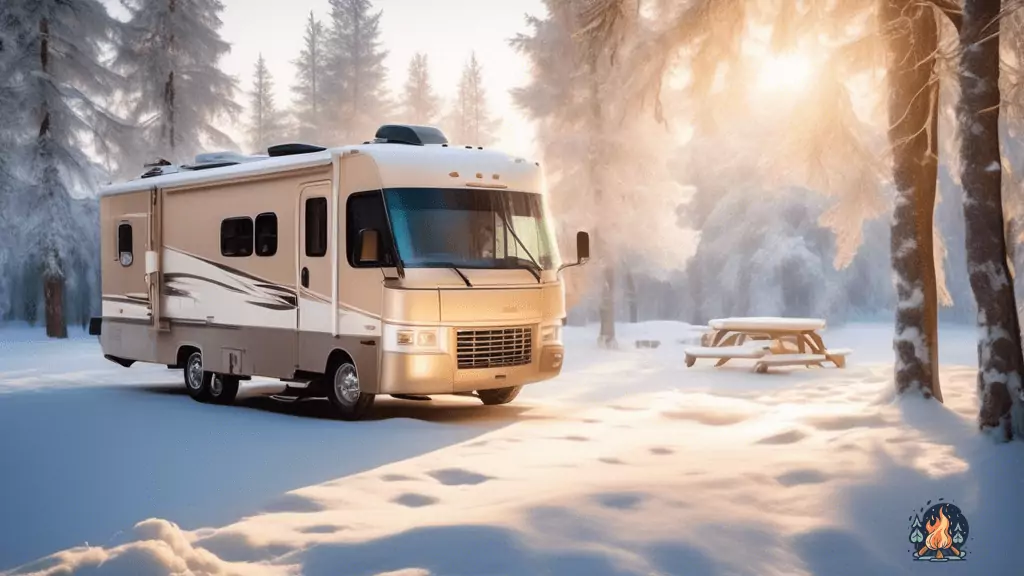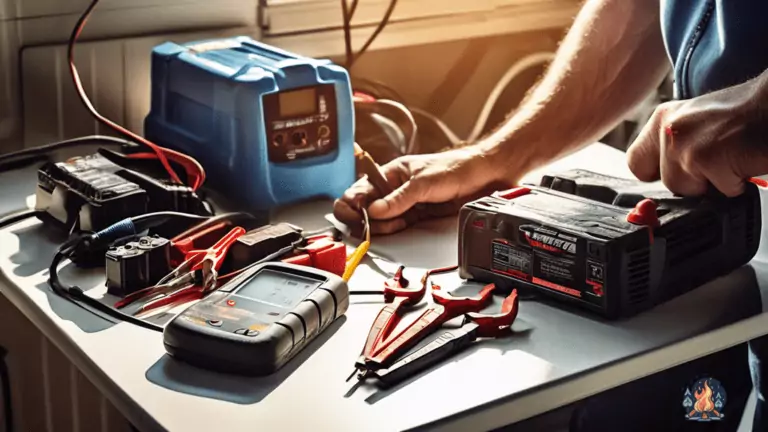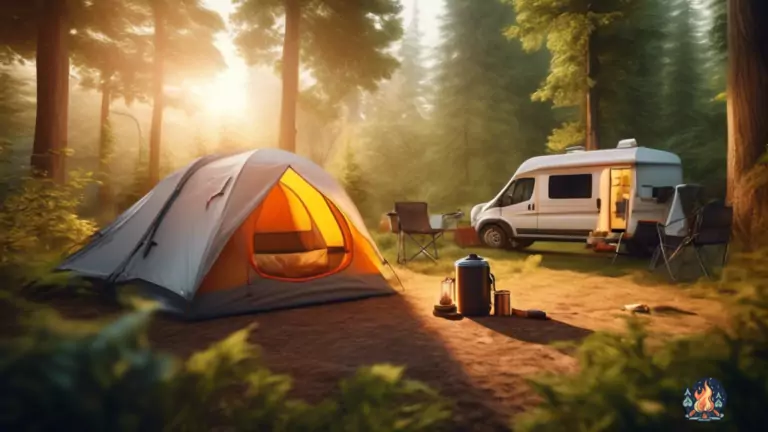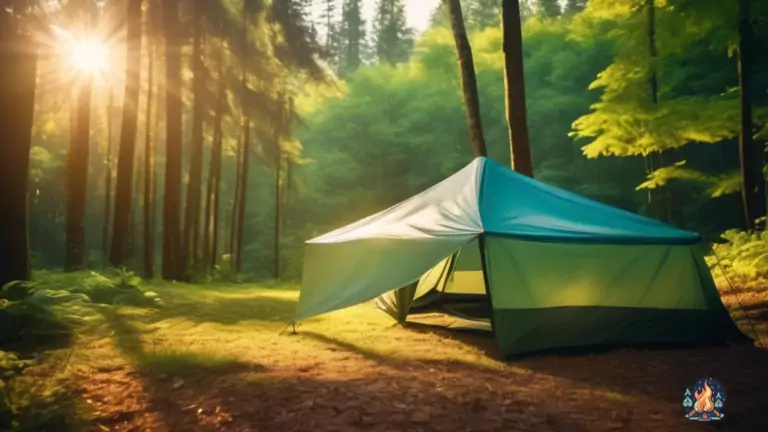Essential RV Winterization Tips
by Kevin Fairbanks • Updated: January 21, 2024
Get expert tips to keep your RV cozy and running smoothly all winter long. Don’t let the cold stop you from adventuring! Click here for essential RV winterization tips and ensure a hassle-free season.

Are you ready to hit the road in your RV this winter? Before you embark on your winter adventure, it’s essential to ensure that your RV is properly winterized.
According to recent statistics, over 9 million Americans own an RV, and many of them enjoy using it year-round. However, winter can bring some unique challenges for RV owners, such as freezing temperatures and harsh weather conditions. But fear not! In this article, we will provide you with essential RV winterization tips that will help you protect your beloved home on wheels and ensure a cozy and comfortable winter camping experience.
Now, you might be thinking, why is winterizing your RV so important? Well, here’s the deal. Freezing temperatures can wreak havoc on your RV’s water system, pipes, and exterior, causing costly repairs and potential damage. But don’t worry, with our expert tips and a touch of humor, you’ll be well-equipped to tackle the winter season like a pro.
So, grab a cup of hot cocoa, bundle up, and let’s dive into the essential RV winterization tips that will keep you warm, safe, and worry-free during the chilly months ahead.
Key Takeaways
- Drain and flush the water systems to prevent freezing and damage during winter.
- Insulate the RV to maintain a comfortable temperature and save energy.
- Protect the tires by inflating them to the recommended pressure and covering them to prevent cracking.
- Use RV-specific antifreeze to protect the plumbing system from freezing and bursting.
Preparing the Water System
Now that you know the importance of winterizing your RV, let’s discuss how to prepare the water system to prevent freezing and potential damage.
For example, imagine waking up on a cold winter morning in your RV, only to find that your water pipes have burst due to freezing temperatures. By following these essential tips, you can avoid this costly and inconvenient situation.
First and foremost, you need to drain all the water from your RV’s water system. This means emptying the fresh water tank, the hot water heater, and all the water lines. Don’t forget about the toilet and the shower – you don’t want any leftover water lurking around. It’s like trying to hide a snowball in a desert; it just doesn’t work.
Once everything is drained, don’t be tempted to fill up the tank again. Save that for warmer days when you can enjoy a nice, refreshing shower without the fear of turning into an ice sculpture.
Next, you’ll want to protect your water system from freezing temperatures. One way to do this is by using RV antifreeze. No, it’s not the same thing as the antifreeze you put in your car. This magical potion is specifically designed to keep your RV’s water system safe from the chill of winter. Simply pour it into the drains, toilets, and sinks, and it will create a protective barrier that will make Jack Frost shiver in his boots. And don’t worry, it’s non-toxic, so you won’t have to worry about your furry friends getting into mischief.
So, go ahead and give your water system the winter protection it deserves. Your RV will thank you, and you’ll be able to enjoy the winter wonderland without any unexpected surprises.
Insulating and Sealing the RV
To maximize coziness and efficiency during the colder months, make sure to insulate and seal your motorhome properly. This will help keep the cold air out and the warm air in, ensuring that you stay toasty and comfortable inside your cozy little home on wheels.
Here are four essential tips to help you get started:
- Seal the windows and doors: Check for any drafts or gaps around your windows and doors and seal them up. You don’t want any pesky cold air sneaking in and ruining your warm and snug atmosphere. Plus, sealing those cracks will also help keep out any unwanted guests, like spiders or insects who are also looking for a warm place to hibernate. It’s a win-win situation!
- Insulate the walls and floors: Just like you, your motorhome needs some extra layers to stay warm in the winter. Consider adding insulation to the walls and floors to provide an extra barrier against the chilly weather. This will help prevent heat loss and keep your cozy space nice and toasty. Plus, it might even help muffle any noise from outside, so you can enjoy a peaceful night’s sleep.
- Cover the vents and skylights: Don’t forget about those vents and skylights! While they are great for letting in fresh air during the warmer months, they can also be a source of cold drafts in the winter. Cover them up with insulated vent covers or blankets to keep the cold air out and the warm air in. It’s like giving your motorhome a cozy winter hat!
- Use thermal curtains or window coverings: Another way to keep the cold air at bay is by using thermal curtains or window coverings. These specially designed curtains have a thermal lining that helps insulate your windows, keeping the warmth inside where it belongs. Plus, they come in all sorts of fun patterns and colors, so you can add a touch of style to your motorhome while staying cozy.
By following these tips and properly insulating and sealing your motorhome, you’ll be able to enjoy a cozy and efficient winter camping experience. So go ahead, grab a warm drink, snuggle up under a blanket, and embrace the winter wonderland outside your cozy little home on wheels.
Protecting the Exterior
One effective way to protect the exterior of your RV during the winter is by applying a high-quality wax. Just like how you slather on sunscreen to protect your skin from the harmful UV rays, think of wax as the sunscreen for your RV. It creates a protective barrier that shields your vehicle from the harsh winter elements like snow, ice, and even road salt. Plus, it gives your RV a shiny, polished look that will make all the other campers jealous.
So, grab a bottle of wax, put on some catchy tunes, and get ready to give your RV a spa day like no other.
But wait, there’s more! Another way to protect the exterior of your RV is by covering it with a breathable RV cover. Think of it as a cozy winter coat for your beloved home on wheels. This cover acts as a shield against snow, rain, and other unwanted surprises that Mother Nature may throw at you. It also keeps the dirt and debris away, so you won’t have to spend hours scrubbing and cleaning when spring rolls around. Plus, a cover adds an extra layer of insulation, keeping the cold air out and the warmth in.
So, give your RV the gift of a stylish winter outfit and let it hibernate in style while you cozy up indoors.
Winterizing the Propane System
Don’t forget to check the propane system in your RV before winter hits. Did you know that approximately 60% of RV owners use propane for heating during the winter months? So, it’s important to make sure your propane system is in good shape to keep you warm and toasty on those chilly nights.
Here are a few things you should do to winterize your propane system:
- Inspect the propane tank. Take a close look at your propane tank to make sure there are no signs of damage or leaks. If you spot any issues, it’s best to get them fixed before winter arrives. You don’t want to end up with a freezing cold RV and a potentially dangerous situation on your hands.
- Check the propane lines. Give your propane lines a thorough inspection to ensure there are no cracks or leaks. If you find any, it’s essential to get them repaired or replaced as soon as possible. You don’t want to be left without heat in the middle of winter because of a faulty propane line.
- Test your propane appliances. Before winter sets in, test all your propane appliances to ensure they are functioning correctly. This includes your furnace, stove, and water heater. It’s better to discover any issues now so you can get them fixed before you’re in the middle of a freezing cold RV with no hot water or warm meals.
Remember, taking care of your propane system now will save you from potential headaches and chilly nights later. So, grab a cup of hot cocoa, put on your inspection goggles, and make sure your propane system is ready to keep you cozy all winter long.
Storing and Maintaining the RV during Winter
During the winter months, it’s important to properly store and maintain your RV to ensure its longevity and functionality.
First off, make sure you find a nice cozy spot for your RV to hibernate. Look for a covered storage facility or a spot in your garage if it’s big enough. You don’t want your poor RV freezing its tires off in the cold winter weather. Plus, it’ll appreciate the extra protection from snow, ice, and those pesky critters who might mistake it for a warm winter hideout.
Next, don’t forget to give your RV a good cleaning before you tuck it away for the winter. Trust me, you don’t want to discover a mystery stain or a forgotten sandwich in the fridge when you finally take it out of storage. Scrub away all the dirt and grime, and don’t forget to empty and clean out the wastewater tanks. You’ll thank yourself when you’re not dealing with any unpleasant surprises when spring rolls around.
Now, let’s talk about maintenance. It’s important to check all the systems and components of your RV before putting it into hibernation. Give the battery a good charge and disconnect it to avoid any drain. Make sure to top off all the fluids, like antifreeze, oil, and windshield washer fluid. And don’t forget to inflate the tires to the recommended pressure. You don’t want them to go flat and ruin your plans for that epic road trip come spring.
Remember, taking care of your RV during the winter is like giving it a warm hug and a pat on the back. So, show your RV some love and it’ll reward you with many more adventures in the future.
Happy winterizing!
Frequently Asked Questions
How can I prevent my RV’s pipes from freezing during winter?
Worried about your RV’s pipes freezing in winter? Ever seen an ice sculpture in your bathroom? Avoid costly repairs by insulating pipes, using heat tape, and keeping a steady flow of water.
What are the necessary steps to protect the RV’s battery during winter storage?
To protect your RV’s battery during winter storage, disconnect it from the RV and use a battery maintainer or trickle charger. Don’t let it freeze! Give it a cozy blanket of warmth by storing it in a dry, temperature-controlled area.
Is it necessary to cover the RV with a tarp or RV cover during winter?
No, you don’t need to wrap your RV in a tarp like a giant burrito during winter. While it may seem cozy, it can actually trap moisture and cause more harm. Let your RV breathe, just like you do!
Can I use antifreeze in my RV’s freshwater tank during winterization?
Sure, you can use antifreeze in your RV’s freshwater tank during winter. It’s like giving your tank a cozy winter sweater to keep it from freezing. Just make sure to follow the manufacturer’s instructions for proper usage.
Are there any specific precautions I should take to prevent pests from entering my RV during winter storage?
To keep pesky critters out of your RV during winter storage, take these precautions: seal any holes or cracks with steel wool, place mothballs in storage compartments, and sprinkle cinnamon or peppermint oil around the exterior. No pests, no problem!

Hi, I’m Kevin, a lifelong camping enthusiast and the voice behind Campfire Discoveries. From tent to RV to cabin camping, I’ve explored it all. Join me as we share stories and tips around the campfire, deepening our connection with the great outdoors.
Keep Reading
-
Maintaining Your RV Battery: Tips And Tricks
Get expert tips and tricks for RV battery maintenance to ensure long-lasting power on the road. Discover how to keep your battery in top shape and click here for essential advice!
-
Must-Have Camping Gear For Outdoor Enthusiasts
Get ready for your next outdoor adventure with our must-have camping gear! From tents to cooking equipment, discover the essential items every outdoor enthusiast needs. Don’t miss out – click here to start packing for your next camping trip!
-
Protect Your Campsite With A Camping Tarp
Enhance your camping experience with a durable camping tarp! Learn how to protect your campsite and stay dry in any weather conditions. Click now to discover the ultimate camping companion for your next outdoor adventure!



